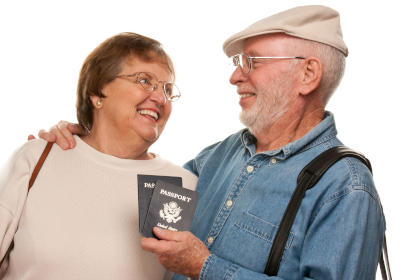Traveling in your golden years can be exciting, but while you embark on your adventures, prioritizing safety is important. New destinations can be challenging due to a lack of familiarity with the location and the potential to get lost, and some areas can even be risky for tourists. Careful preparation can help you avoid potential risks and focus on enjoyable experiences instead.
Medbox: Never Sort Medications Again
Taking appropriate measures, such as securing important documents and avoiding common scams, will make a significant difference. This guide provides crucial travel safety tips for seniors to help you feel more confident and worry-free during your travels.
Travel Safety Tips For Seniors
These smart travel tips will help you stay safe so you can enjoy your adventures:
1. Carry Copies of Important Documents
Keep printed and digital copies of your passport, identification, travel itinerary, and medical records in a separate space from the original documents. If the originals are in your luggage, put the copies in a carry-on bag, and vice versa.
Alternatively, you can keep these copies with a trusted friend or family member. This strategy allows fast retrieval of needed information when items go missing or get stolen. It also makes it easier to replace these documents at embassies or consulates.
Generally, it is recommended to keep important identifying documents like passports on hand to reduce the risk of theft. However, if you prefer to store these items, make sure to use a safe or lockbox, which is usually available in hotel rooms.
2. Keep a List of Emergency Contacts
It’s good to keep a list of important contacts when visiting foreign locations. Your list may include the phone numbers of family members, friends, local emergency services, and your contacts at your country’s embassy or consulate.
Your emergency contact list can either be a printed copy, stored in your wallet, or a digital file, stored in your phone. Give a copy to your travel partner when possible. Having these emergency contacts assures your safety, as you can easily call for help if an unexpected event occurs. If you are traveling internationally, make sure that you are familiar with how to make calls to international numbers if you are not using a personal mobile device — for example, know the international area codes for your emergency contacts.
3. Share Your Itinerary With a Trusted Person
Tell a family member or friend about your travel details, including your flight schedules, hotel reservations, and planned activities. Having this information available is essential during emergencies because it allows another person to contact authorities or help you if you become unreachable.
It’s also important to notify friends and family members when your travel itinerary changes during your trip. Besides improving your safety, this simple act gives your loved ones peace of mind about your whereabouts and well-being. If you have a mobile device with international roaming activated, you can also share the location of your device with your family members.
4. Purchase Comprehensive Travel Insurance
Comprehensive travel insurance covers unexpected events including medical emergencies, trip cancellations, lost luggage, and unforeseen delays. You’ll most likely need it if you have any medical conditions or when visiting a destination with unpredictable weather — this is especially true for international trips where your medical insurance is likely invalid.
Compare multiple insurance providers and select a plan that addresses your unique requirements, including pre-existing medical conditions and your planned trip activities. For example, if you’re planning a two-week hiking trip in the Swiss Alps, you’d be better off buying insurance from a company that covers high-altitude trekking. You can always check with your credit card companies, airlines, or travel agencies that may either provide insurance or allow you to add on this service to your bookings.
Your Prescriptions Sorted and Delivered
5. Research Local Health Facilities Before Departure
If you have specific medical needs, it is important to look for hospitals, clinics, and pharmacies that are located near your travel destination well before your visit. This can be accomplished by doing a simple Google search. The U.S. Embassy or Consulate website, the World Health Organization (WHO), and the International Association for Medical Assistance to Travelers (IAMAT) are excellent resources for healthcare information and finding accredited doctors worldwide. For those who are tech-savvy, apps such as Google Docs, Air Doctor, and Medigo can also be useful.
You may also be able to check with your travel insurance provider. Many travel insurance companies have partnerships with international hospitals and can provide a list of covered facilities. Knowing the medical facilities for healthcare in the area prepares you for any unforeseen emergencies and gives you peace of mind. It would be worth forgoing a trip or adjusting your destination if you can’t find a reliable medical facility in the area where you plan to travel. This is especially important for seniors who often need medical attention.
6. Register With Your Embassy or Consulate When Traveling Internationally

When traveling internationally, you might want to register with your country’s embassy or consulate. This move reinforces your protection. Your government receives your travel details and contact information through this process, and this allows them to contact you during emergencies like natural disasters, political unrest, or lost passports.
The United States government runs the Smart Traveler Enrollment Program (STEP), which allows U.S. citizens and nationals to register their international travel plans. After you register on the official website, you’ll start receiving alerts and messages from nearby U.S. embassies or consulates.
7. Choose Accommodations with Strong Security Measures
Another travel safety tip for seniors is to choose secure accommodations. When booking hotels or rental properties, look out for safety features such as key card entry, staffed reception, or security personnel. Check the reviews of previous guests at the accommodation on trusted websites such as Google, TripAdvisor, Booking.com, or Expedia.
Being close to emergency response services delivers additional safety protection. These protective measures ward off threats and help you sleep better at night.
8. Avoid Traveling Alone in Unfamiliar Areas
It’s not safe to explore unknown neighborhoods by yourself because language barriers and cultural differences can create extra difficulties. Travel with someone who knows the area or book a tour guide on reputable platforms like Viator or GetYourGuide. It can help to have a mobile translator when visiting a country where you do not speak the language — most mobile phones have free translation apps, including Google Translate.
Besides the cultural disconnect, traveling alone in unfamiliar places increases your chances of getting lost or facing unexpected dangers. With traveling companions, you’ll feel more secure, enjoy sharing your unique experience, and learn about different cultures.
9. Maintain a Steady Hydration and Medication Schedule
Stay hydrated throughout your travels, and remember to stick to your medication routine. Drinking enough water protects you from dehydration and keeps you fresh through the stress of traveling. Always carry a reusable water bottle. Staying hydrated is especially important when traveling to areas with extreme heat or high elevation. Also, make sure to research areas well if you are planning to do outdoor excursions — some hiking trails and other outdoor areas may not have areas to refill water and require you to bring enough water to complete the trail, especially in areas where potable water sources are not guaranteed.
It can be hard to keep track of your medication routine, especially if you’re traveling internationally. The difference in time zones can throw off your schedule. So, use reminders or professional medication management services like MedBox to stay on track.
Medbox: Simplify Your Prescription Routine
10. Stay Informed About Local Travel Advisories
Before traveling, check out government websites and travel forums to find updates about weather conditions, political situations, and health conditions of your destination. These advisories inform you about potential dangers, highlight dangerous locations to avoid, and inform you of local rules that will improve your safety.
Even while on your trip, check for updates on these advisories. Consistent access to updates enables you to make smart choices that keep you safe and secure during travel.
Conclusion
Traveling is an exciting way to enrich your life in your golden years. But while you hope for the best, make sure you prepare for the worst. The travel safety tips for seniors that we covered in this article will help protect your health and belongings, and empower you to explore new cultures and destinations with confidence.


